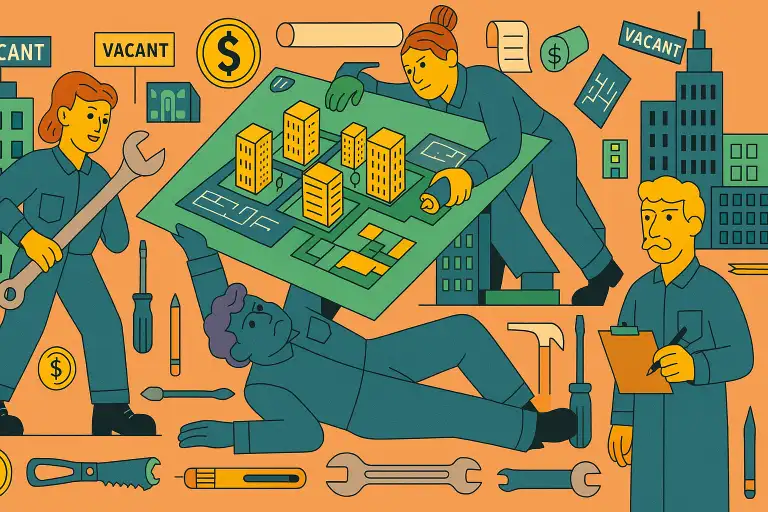South Korea’s New Leader Takes Office Amid Economic Despair and Social Polarization
As the dust settles from South Korea’s high-stakes snap election, President Lee Jae-myung inherits a deeply divided country where inflation, climate crisis, and social fragmentation have eroded public trust.

South Korea has entered a transitional phase following a rare snap presidential election, triggered by the impeachment of former President Yoon Suk-yeol. The election of Lee Jae-myung, a seasoned opposition leader, marks the beginning of a new administration tasked with stabilizing a country that has faced months of political paralysis, economic distress, and declining public confidence in democratic institutions.
The incoming government inherits a broad spectrum of structural challenges. Domestically, South Korea grapples with sustained inflation, rising public debt, a contracting small business sector, and growing disparities across regions and age groups. On the international front, diplomatic relationships—particularly with the United States and key Indo-Pacific partners—require recalibration following several months of uncertainty.
President-elect Lee has campaigned on a platform emphasizing institutional reform, economic revitalization, and democratic restoration. The central question now is whether the new administration can translate political momentum into governance outcomes, amid elevated expectations and complex constraints.
The Lee administration assumes office with a favorable parliamentary landscape and a clear legislative opportunity to reverse the prolonged gridlock that characterized the previous government. Former President Yoon’s use of the presidential veto had effectively stalled major policy initiatives, deepening partisan divides and weakening public trust in state institutions.
Among the most contentious bills blocked under the Yoon administration were the Grain Management Act, which aimed to stabilize rice production and prices; the Broadcasting Act, targeting governance reform in public media; and the so-called “Yellow Envelope” bill, designed to strengthen labor protections. These bills, now expected to be reintroduced, represent a test of the new administration’s ability to deliver policy results early in its term.
Legislative momentum is further bolstered by the Democratic Party’s control of the National Assembly. Observers anticipate a swift effort to pass key economic and social legislation, including reforms related to prosecutorial oversight, media independence, and labor protections. However, the administration’s success will depend on its capacity to balance speed with political consensus, particularly amid concerns about overreach and backlash from conservative constituencies.
Prosecutorial Reform
The new administration faces heightened expectations to address one of South Korea’s most entrenched institutional controversies: the role of the public prosecution service. Under the Yoon administration, the perceived politicization of prosecutorial powers—particularly through high-profile investigations against opposition figures—became a flashpoint for national debate, culminating in widespread calls for structural reform.
President Lee Jae-myung has signaled support for a “second phase” of prosecutorial reform, aiming to reinforce checks on investigative power while maintaining rule-of-law standards. Proposals under review include the establishment of an independent pre-indictment review board, restrictions on discretionary investigations into political figures, and reforms to the prosecutor general’s appointment process to ensure greater transparency and political neutrality.
The administration is also expected to revisit the controversial duality of investigative authority between police and prosecutors, which was partially restructured during the Moon Jae-in era but remains a source of institutional friction. A new approach may emphasize functional separation between agencies, with legislative backing to reduce overlap and minimize conflicts of interest.
However, observers caution that attempts to rein in prosecutorial influence may provoke strong institutional pushback. “The prosecution remains one of Korea’s most resilient power centers,” says constitutional law expert Yoon Ji-ho. “Any meaningful reform will require both public support and internal negotiation—without triggering perceptions of political retaliation.”
Restoring trust in the justice system is viewed as essential to reinforcing democratic legitimacy, especially after a period in which investigative authority was widely seen as a political weapon. The challenge for the new government lies not just in curbing excesses, but in establishing durable frameworks for independence and accountability.
Inflation and the Economy
The incoming administration faces immediate pressure to address the country’s persistent cost-of-living crisis. Over the past two years, inflationary pressures—driven by global energy prices, a weak won, and supply chain disruptions—have strained household finances, disproportionately affecting low- and middle-income earners. Energy tariffs, utility bills, and food prices remain elevated, with Korea’s consumer sentiment index hovering near decade lows.
According to data from Statistics Korea, real income growth has stagnated, while discretionary spending has contracted for the seventh consecutive quarter. Small business revenues, especially in the food and beverage sector, are in decline. A report from Korea Credit Data shows that restaurant and café sales fell over 10% year-on-year in Q1 2025, with fixed operating costs outpacing earnings. These trends have contributed to a surge in business closures, particularly in regional cities.
President Lee’s campaign outlined a response centered on short-term price stabilization and long-term structural adjustment. Immediate measures include temporary price caps on key public services, the reintroduction of targeted subsidies (e.g., energy vouchers), and a review of Korea’s food supply and logistics networks to reduce consumer exposure to volatility.
Longer term, the government is expected to pivot toward rebuilding Korea’s domestic demand base, including stimulus for household consumption, incentives for small business reinvestment, and wage growth policies. A revised industrial policy, emphasizing green technology, digital platforms, and biotechnology, is also anticipated.
Still, the administration faces a balancing act between fiscal responsibility and growth stimulation. Korea’s sovereign debt-to-GDP ratio has climbed to over 53%, prompting concerns about interest burdens and global credit ratings. Lee’s economic team must convince both domestic voters and international markets that pro-growth policies can coexist with financial discipline.
The Climate Imperative
South Korea’s climate policy stands at a critical juncture. The country has experienced a sharp rise in climate-related disruptions over the past three years, from record heatwaves and urban flooding to worsening air quality and energy instability. As one of the world’s top ten greenhouse gas emitters, South Korea faces mounting international pressure to accelerate its energy transition—while balancing domestic economic resilience.
President Lee has pledged to reframe climate policy not only as an environmental responsibility but as a matter of climate equity, integrating social welfare into emissions and energy planning. Key early measures under review include a progressive energy subsidy system, localized climate resilience investments, and expanded incentives for green SMEs and clean technology startups.
The administration also seeks to reform Korea’s existing carbon pricing mechanisms. While the national emissions trading system (K-ETS) has been operational since 2015, its effectiveness remains limited due to low carbon credit prices and weak enforcement. A new policy push may introduce minimum pricing floors and stricter compliance penalties—subject to industrial sector negotiations.
Urban planning is another focal point. Seoul and other high-density cities have struggled to manage urban heat island effects and water drainage amid extreme weather. The Lee administration is expected to link climate adaptation to housing, transportation, and infrastructure investment, particularly in underserved regions.
Yet the political calculus remains complex. Industrial lobbies continue to resist deeper regulation, and public sentiment on green taxes is mixed amid cost-of-living concerns. As such, the government’s success will depend on its ability to position climate action as an enabler of jobs, public health, and energy security—not a tradeoff.
Diplomacy and the Global Stage
South Korea’s international standing weakened notably in the final phase of the Yoon administration, amid a series of diplomatic missteps and deteriorating coordination with key partners. Unilateral statements on security, shifting positions on historical issues with Japan, and a contentious relationship with the United States over industrial policy created uncertainty among allies and markets.
President Lee enters office with an urgent need to restore diplomatic consistency and predictability, particularly ahead of a high-profile opportunity to reassert South Korea’s role on the global stage: hosting the 2025 APEC Summit in Gyeongju. The meeting will mark Korea’s return to multilateral diplomacy and offers a venue to advance its regional and economic interests under a more pragmatic foreign policy framework.
Relations with the United States remain pivotal. Trade tensions persist over the Inflation Reduction Act (IRA) and CHIPS and Science Act, both of which have impacted Korean automakers and semiconductor firms. Lee’s administration is expected to pursue a recalibration of these trade issues through bilateral mechanisms, while emphasizing South Korea’s strategic role in global supply chains and regional stability.
Additionally, the new government is likely to revive engagement with ASEAN, the European Union, and middle-power coalitions to diversify its foreign policy portfolio. The administration has hinted at repositioning Korea as a mediator between advanced and emerging economies on digital governance, AI ethics, and climate finance.
Analysts caution that restoring diplomatic credibility will require more than symbolic gestures. The central challenge, they note, is consistency—international partners will closely observe not only policy statements, but also the professionalism, coherence, and follow-through that define their execution.
Social Division and National Cohesion
Beneath Korea’s economic and political challenges lies a deepening social fragmentation. The 2025 election highlighted stark divides not only along generational and regional lines but also across gender and class. Voter data showed strong polarization between urban and rural areas, younger and older voters, and particularly between young men and women — signaling a society increasingly fractured in its political identities and policy priorities.
The Lee administration inherits a nation where identity politics and ideological tribalism have supplanted civic discourse. Former conservative leaders, including figures like Lee Jun-seok, actively cultivated generational grievance and gender resentment, particularly among 20- and 30-something males. At the same time, regional disparities — especially between Seoul’s affluent districts and struggling provincial cities — have fed into perceptions of systemic unfairness.
President Lee has called for “restoring public trust and institutional dignity,” but the path to national cohesion will require more than rhetoric. Policy-wise, the administration is expected to promote inclusive labor reforms, expand mental health and youth support programs, and overhaul housing and education equity frameworks that fuel generational conflict.
Bridging social divisions may also involve reshaping political communication itself. The prior era’s combative media ecosystem and populist digital rhetoric—often algorithmically amplified—will require a deliberate shift toward constructive civic dialogue. Efforts to curb misinformation and promote media literacy are expected to feature in broader reforms aimed at restoring the quality of Korea’s democratic discourse.
Ultimately, the new administration’s legitimacy may hinge on whether it can depolarize the national mood while delivering policy gains that improve lives across demographic boundaries.
From Transition to Transformation
The election of President Lee Jae-myung marks more than a political changeover. It closes a volatile chapter in South Korean politics—punctuated by the first presidential impeachment since 2017—and opens a fragile window for structural renewal. The expectations placed on the new administration are substantial: to reverse economic stagnation, to restore institutional credibility, and to rebuild a sense of national cohesion.
However, political capital alone will not be enough. The challenges ahead are structurally embedded, long in the making, and resistant to symbolic leadership. Legislative control offers President Lee room to act, but execution and impact will be the metrics by which this government is ultimately judged. Can public trust in government be restored through visible, material improvements in daily life? Can policy reforms survive institutional resistance and partisan skepticism?
Beyond domestic affairs, global watchers will also be looking for signs that Korea is reasserting its position as a reliable, values-based partner amid growing geopolitical competition in the Indo-Pacific. Lee’s approach to the U.S.-China balance, regional trade diplomacy, and green energy transition will shape South Korea’s identity well beyond his term.
In a democracy fatigued by scandal and polarization, Lee’s victory is neither a blank check nor a final destination. It is the start of a national trial—one that may determine the trajectory of South Korean governance for the next decade.



Comments ()